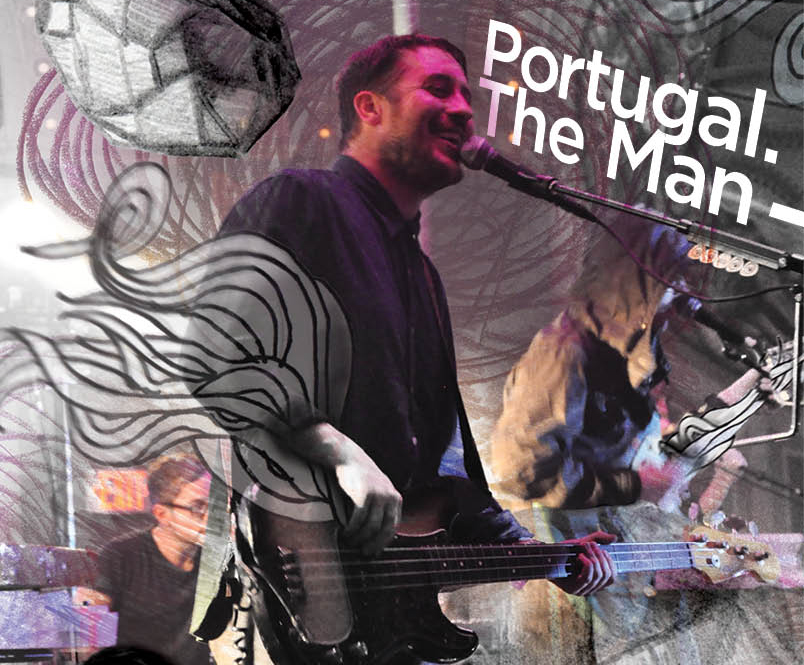By Jef Krohn
Photography by Guy Blanchard. Graphic design by Justin Mortzheim
Portugal. The Man is arguably one of the greatest bands to have ever come out of Portland. Arguable not because of their sheer magnitude and immense popularity compared to the likes of the Decemberists or the Dandy Warhols, but because I’m not sure they are a Portland band to begin with. In most interviews, they’re quick to place their roots in Alaska.
However, there is one overtly defining feature of this band, they are one of the hardest working in the industry today, having been recording and touring constantly and consistently since 2004. Portugal. The Man’s most recent album Evil Friends has been steadily rising on the charts and is ranked #28 at the time of this article’s writing. Their eccentric-electronic retro-pop sound has even earned them a spot on Taco Bell’s “Nacho Wrap” national advertising campaign. I sat down with Zach Carothers, co-founder of Portugal. The Man, prior to their show at the Crystal Ballroom to discuss their success, the confusion over the band’s hometown, and the challenges involved in making it big in the music industry. There is no arguing the fact that Carothers, and other founding member John Gourley, are from the Alaskan wilderness. They were born and raised in the middle of nowhere, completely cut off from the rest of the world. Their sole inspiration for music was based on their parents’ old record collections, an eclectic collaboration of ‘60s and ‘70s pop music. It wasn’t until Carothers moved to Portland to go to college that he discovered the independent underground music scene and all it entailed. As Carothers recalls, “I moved down to Portland to go to college, and my friends started taking me to all these little shows at bars that cost like $3 or $5, I was like…Oh, my god! I went and saw a show every night; we just went crazy when we moved down here.”
Moving to Portland was just the start of Carothers’ music career but it was not the start of Portugal. The Man. Soon he wasn’t just going to shows, he was the show, and he was performing all over town. At this point there wasn’t really a band, and Gourley wasn’t a part of the group. The way Carothers tells it, Gourley was still deep in the Alaskan wilderness, freezing his ass off in a quiet, one-room cabin listening to old Hendrix albums that he borrowed from his parents. But that was about to change. Carothers tells us, “I was singing, and I’m not that good of a singer. John and I played music growing up but he was a shy guy—he’s always been a shy guy—but he made a demo and we were blown away [by his singing]. I called him down and he was here two days later.” That was the start of their first real band, Anatomy of a Ghost, and from 2002 to 2003 their sound attracted droves of local fans. However, they soon split up and moved back to Alaska, presumably to a larger cabin stocked with a wider selection of records. It was then that Gourley started his own side-project, called Portugal. The Man, in—dramatic pause—Alaska, not Portland.
When Carothers joined on bass, they started recording demos and in 2004 moved back to Portland to set up base and continue to record. It was in that strategic and definitive move to Portland, with the sole intention of setting up shop and recording PTM’s first record that establishes them as a Portland band. Eventually they stepped out from the studio curtains to hit the pavement and spread the sound they created. They toured constantly, playing every dive bar they could find and gaining serious notoriety in the process. Carothers recalls those early hard years on the road: “You just gotta be poor and live in a van…One day a week we got to go to a fast food place and get a dollar item. But we got to meet a lot of people. They’d take us on tour, we’d sleep on people’s floors, they’d cook us food.”
In 2005, they landed a record deal with Fearless Records—a label out of Westminster, California, not Portland—and released their debut album, Waiter: “You Vultures!” in 2006. From then, PTM continued to tour, record, and gain widespread recognition and national popularity. In 2007, following their release of Church Mouth, they pulled off their first U.S. tour, followed by a European tour. By 2008, they were on their own independent label with another new album Censored Colors, selling out shows all over the country. Carothers tells us the secret to their success: “It’s all about hard work…A day doesn’t go by where we don’t play some kind of music where we’re either in a studio, downstairs in a basement, or at some place playing a show.”
But is it really all about working hard? Or could the band’s hometown have something to do with their success?
I mean, who’s to say that an Alaskan band wouldn’t have fared any better? Just look at Jewel, the Builders and the Butchers, Metalcore, and Libby Roderick—all influential Alaskan musical artists that have made it big in their own right. So why not associate the band with Alaska? Of course one reason could be that there’s zero-to-no indie scene in Alaska, nothing PTM fans can relate to…but as Portlanders, they represent an entire indie empire that a fan can really rally behind. Perhaps it is the support and recognition for do-it-yourself musical creationists which Portland excretes from every alleyway and side street that perpetuates this whimsical hometown declaration.
Nonetheless, by 2009, Portugal. The Man was a record-pumping tour-tantalizing monster house. Between playing Bannaroo and Lollapalooza, they released The Satanic Satanist, produced by Paul Kolderie, (producer to The Lemonheads, The Mighty Mighty Bosstones, and Radiohead). Early 2010, they released yet another album, American Ghetto, and in late 2010 they signed with Atlantic Records. It was at this point that things really began to take off for the band.
Working with basically the who’s-who in the recording kingdom, Portugal. The Man continued their hard work ethic and produced some of their best work to date. They quickly returned to the studio to work with producer Paul Hill (Rihanna, Pink, MIA, Christina Aguilera), and engineer Andy Wallace (favorite of Rick Rubin and engineer for Run DMC, the Cult, Nirvana, Linkin Park, Rush, and Coldplay), they released In the Mountain In the Cloud in 2011.
Their sound was developing into more of a refined and cleaner Technicolor version of their former rugged yet classic style. Imagine if Pink Floyd and AC/DC, had a baby, got a divorce, then Pink Floyd remarried U2, and they raised that baby together (because let’s face it—AC/DC is just an irresponsible, alcoholic, dead-beat father). The adult version of that child would be Portugal. The Man, and their sound was catching on. Their songs started to climb pop charts and were placed on rotation at most pop radio stations. After returning to the Bonnaroo Music Festival and repeating another performance at Lollapalooza, they headlined a U.S. tour and opened for the Black Keys all over Europe and Australia.
Eventually all the touring and recording had taken its toll and two of the members had had enough. In 2012, Ryan Neighbors left the band to start his own project (Hustle and Drone–Stay tuned, article to come!) and would be replaced by Kyle O’Quin. At the same time, former child actor Kane Ritchotte (of the TV series Monk) would replace Jason Seachrist at the drums. As Carothers tells us, “It’s all about the love with this thing. If someone’s not happy or we’re not happy with somebody, it’s like you gotta just kill it, ‘cause that’s the kind of thing that can ruin bands.” He continues, “It’s a very demanding thing to literally have like no free time, to be on call 24 hours a day, 7 days a week. [I mean,] I once worked up the courage to ask a girl out who lived next door to me at the time. Two months went by and I didn’t have a free night to take her out.” Free time seemed to be in short supply as the band headed into the studio yet again, between tours to record Evil Friends.
This time they collaborated with famed producer Brian Burton, otherwise known as Danger Mouse, Grammy-Award winning producer for Beck, Gorillaz, U2, the Black Keys, and Gnarls Barkley, among others. The experience was a dream come true for Carothers, as he describes writing and recording with Burton: “[Gourely] writes all the songs. I mean, we all have our roles…Kyle is a classically trained pianist, so he knows more about music theory than all of us combined. Kyle is structured and John [Gourely]is very loose, and I help with the lyrics, that’s my thing.” But this recording experience was different. “[Barkley] knew how to get the best things out of us.”
Evil Friends, with lyrics that drive home messages of freethinking, intellectualism, and insightful politics, combined with retro-synthesized heavy melodic combustion, is a tasty treat to even the most discriminating ears. On the album, “Modern Jesus,” is a mega-pop melody with a driving beat and lyrics that focus on the perils of modern-day religion—a theme that has been repeated multiple times in multiple albums by Portugal. The Man. And there is a reason for it. Carothers explains, “As a rule we as a band don’t comment on religion. [But I will say] I love Alaska, I love Alaskans, and it’s a very strong community; but there are a lot of people [in Alaska] who take everything a little too far. Both John and I had some crazy experiences with very, very religious people at a very young age.” Perhaps this is one of the reasons why they choose not to associate the band with Alaska? In any case, Carothers prefers that you draw your own conclusions of meaning in his lyrics. As he tells me, “I’ve always been a fan of lyrics that are a little bit vague. If I could talk to Kurt Cobain today, the one thing I would not ask him about would be what his lyrics meant to him because I know what they meant to me, and I put them into context with my own life. That’s my investment. That makes me feel like I’m a part of Nirvana.”
Regardless of the meaning, there is no denying the rhythmic tempos and the counterculture appeal to the electro light experience of seeing Portugal. The Man in concert. Few bands are as good live as they are on record, and even fewer are better live. Seeing them live made a fan out of me. As for their origins, whether they choose to call themselves Portlanders for credibility or for the love of our city, we’ve adopted each other.
The undeniable truth is that they are a Portland band, not just because they say so but because we want them to be. In the meantime, Portugal. The Man will continue to tour, continue to grow, and continue to succeed, and I honestly wouldn’t expect anything less from a Portland band.

